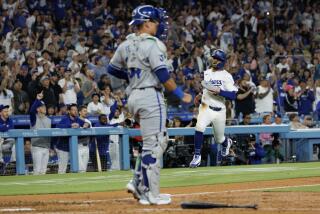WORLD SERIES : McRae’s Regret: ‘Swinging at a Bad Pitch’ : Royals Had Bases Loaded When He Challenged Tudor on First Throw
- Share via
ST. LOUIS — It was the eve of a World Series in which the Kansas City Royals would not be allowed to use their designated hitter, Hal McRae.
“Hopefully,” Manager Dick Howser had said, “we can find a way for his bat to help us off the bench.
“Hopefully, we can find a situation where he can help us win a game.”
Howser found that situation Wednesday night.
It was the seventh inning of a game the Royals were losing to the St. Louis Cardinals, 3-0. The bases were loaded, there were two outs and there was a pitcher on the mound that McRae had once owned.
In five seasons with the Boston Red Sox, left-hander John Tudor had lost five of seven decisions to the Royals, primarily because of McRae, who had 13 hits in 28 at-bats against him, an average of .464.
The 13 hits included five home runs, two of which--a grand slam and a two-run homer--came in the same 1982 game against Tudor at Fenway Park.
“I probably hit every kind of pitch he ever threw me,” McRae was saying at his locker Wednesday night. “I was very confident going up there because of the success I had against him in the past.”
Batting for shortstop Buddy Biancalana, McRae seemed to be the right man at the right time, but this is now a different Tudor, a different time and place.
The first pitch was a tailing fastball, low and out of the strike zone.
McRae, trying to be aggressive, trying not to get behind against a control specialist who won 20 of his last 21 regular-season decisions, went for it, hitting a hard grounder to third baseman Terry Pendleton.
Pendleton tagged the bag, thereby terminating the only Kansas City threat of a game that the Royals lost, 3-0, leaving them one loss from termination.
“I only regret swinging at a bad pitch,” McRae said later. “I don’t regret swinging at the first pitch.
“I went up intent on swinging at it. He had just walked (Steve) Balboni. I felt he would come right back with a strike.
“I’ve driven in a lot of runs, and I’ve done it swinging the bat. I’m thinking that I’m the guy who can get us back in the game. I wanted to hit it hard, to drive in two runs. I can’t put it on anyone else.
“It’s a one-shot deal. I can’t go up taking. I can’t go up hoping he gets behind. I can’t get in a situation where he throws me a bastard pitch for a third strike. I’m not a Punch and Judy hitter who looks for walks. I’ve made a living hitting in those situations, and I can’t change just because I have to do it now as a pinch-hitter.
“I mean, I don’t want to go up with the bases loaded and take a fastball right down the middle. I have to be aggressive. Maybe I was too aggressive, but I don’t think a pinch-hitter can be anything short of that.
“A pinch-hitter always wants to swing at the first pitch, hoping that if he doesn’t put it in play, he at least makes contact, that he hits it foul to relieve the tension and get a feel of the game.”
The Royals got only five hits. Tudor struck out eight. McRae, who drove in 46 runs in his last 56 regular-season games, came up cold but at least made contact.
“I haven’t been sitting around thinking about the difficulty of pinch-hitting,” he said. “That’s no way to prepare. It’s easier, of course, getting four or five chances per game, but I’ve played (in the majors) for 16 years and hit in all kinds of situations. I know what I have to do.”
What he has been doing is making periodic trips to the clubhouse to exercise and swing a bat.
The frustration for McRae and the Royals stemmed from a second Series loss to the pitcher they once dominated.
“You read about a guy suddenly winning 20 games,” McRae said, “and you wonder what he’s doing differently.
“Tudor has changed a lot. The fast ball is still his bread and butter, but he now keeps it out of the middle of the plate. He has a better change-up and better location. I think that location and confidence are responsible for the big change.”
Said Howser: “I don’t know if I’ve ever seen a young pitcher change so much. He still has a good fastball, but he changes speed more and doesn’t walk anyone. You need three or four hits to score one run. His control is so outstanding that when he misses, he’s trying to miss. I mean, you don’t put his numbers together without great stuff, great confidence and a great ballclub behind you. He’s got all three going for him.”
Howser had hoped it was the Royals who had it going in the seventh.
“The big out,” he said, “was McRae. It was the only chance we had.”
And McRae’s only chance, Howser said, may have been to go after the first pitch.
“John Tudor is not going to walk himself out of the game,” the manager said. “If a pitcher like Tudor gets ahead of you, he can bury you. I don’t care how good a hitter you are.”
McRae has long been one of the best.
“I knew he’d pitch me the same way he always had,” McRae said. “I simply swung at a bad pitch, a pitcher’s pitch.
“I failed, but I had wanted the shot.”
More to Read
Go beyond the scoreboard
Get the latest on L.A.'s teams in the daily Sports Report newsletter.
You may occasionally receive promotional content from the Los Angeles Times.










